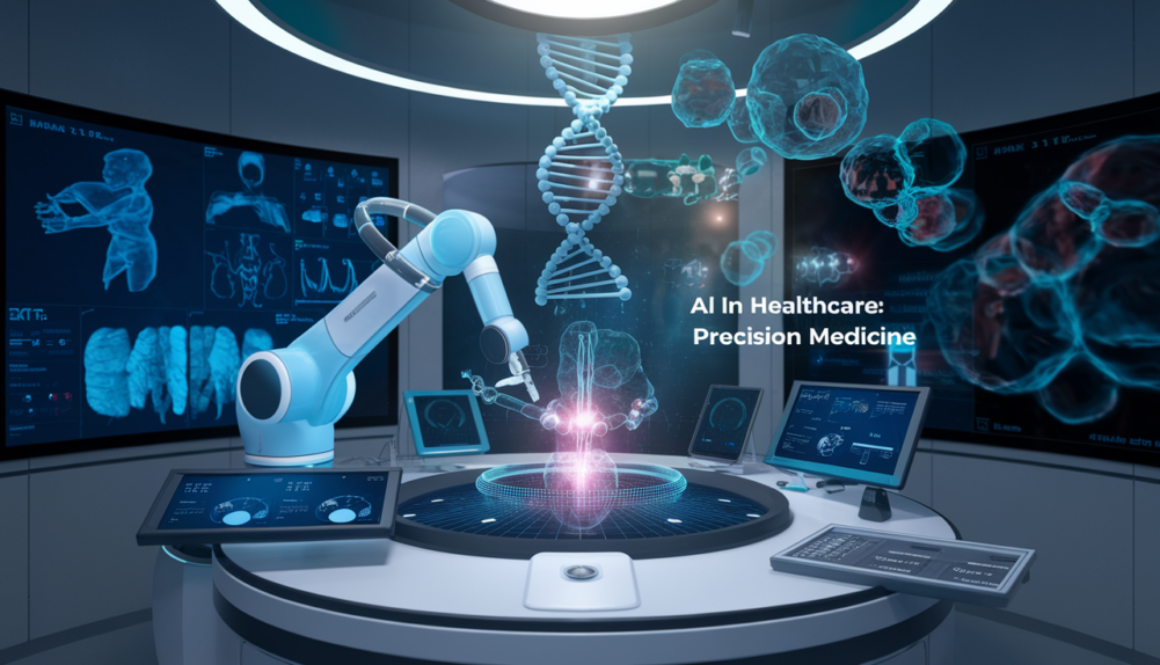AI in Health Care — the Path Toward Precision Medicine
Imagine a future in which your doctor knows the treatment that’s best for you—in some cases before you even know you’re sick. 🔮 No, this isn’t science fiction, but rather the promise of artificial intelligence (AI) in healthcare, creating a pathway toward precision medicine. With healthcare systems worldwide facing pressures from aging populations, chronic diseases and workforce shortages, AI presents a ray of hope as a disruptive technology that could transform the way patients are cared for.
But how far along are we toward this future? 🤔 From predictive AI for diagnostics that can outperform human experts to personalized treatment based on your body’s individual genetic makeup, the possibilities are mind-blowing. Yet, challenges remain. Challenges such as data quality, ethical considerations, and the necessity of a solid technical foundation act as obstacles on this promising pathway. So, stay tuned as we delve into the synergy between AI and precision medicine, and how this potent duo can revolutionize healthcare systems, improve clinical outcomes, and ultimately, make lives better.
Sit back, relax and listen to us talk about AI in health care, from diagnostic tools to personalized treatments to clinical decision support. We will also address the challenges and ethical implications associated with this technological revolution. So let’s dive into how AI might change the future of medicine. So let us start our journey through this revolutionary field.
Let us understand ai in healthcare
Q1: Defining AI and its applications in medicine
AI in healthcare mimics human intelligence to perform complex tasks and evaluate large datasets. It includes natural language processing, machine learning, and deep learning among others. Artificial Intelligence in Medicine: Implementation of Artificial Intelligence can help in better medical diagnosis, effective drug discovery, personalized experience of the patient, robotic surgery, etc.Medical professionals and scientists can solve complex problems that are becoming more common as they address more demanding medical problems. These technologies are designed to enhance healthcare professionals’ capabilities, allowing faster and more accurate diagnoses, more efficient electronic health record access, and personalized treatment plans.
B. Benefits of AI in Healthcare Combination of AI in healthcare has multiple advantages for the patient and the healthcare provider. AI reduces the operational costs, plans the treatment uniquely, and improves patient outcomes. Other potential areas of benefits include enhanced analytics, precision medication, and improved predictive modeling of diseases. Due to its ability to analyze big data, AI outshines human when it comes to pattern recognition. The same features are used in mental health to combine the existing data to identify a pattern of illness and monitor patient’s information to determine their general wellbeing. Additionally, AI is also instrumental in managing chronic diseases and creating awareness of disease prevention concepts. C. Current adoption and future projections In 2018, the global market for AI in healthcare was projected at $19.27 billion, which is likely to increase in the coming years. Adoption of AI in the healthcare sector is currently on an upward trajectory with recent developments showing potential uses. Several companies are currently is developing and modifying their products with AI technology. For example, EliseAI uses AI to handle administrative roles, whereas Pfizer uses it to research drug candidates. As the field for AI and healthcare continue to grow, so will the number of career opportunities. Position such as health informatics specialists and AI engineers are also on the rise where members of the general public can have them. With AI of healthcare applications understood, the other area to explore is AI-Powered Diagnostic Tools and how they significantly contributed to precision medicine. AI-Powered Diagnostic Tools
Pattern detection for early disease identification
AI systems have the ability to see patterns in complex data, and can be used for the early detection of many types of conditions. For example, AI can computerize retinal images to determine cardiovascular risk factors and could even identify major cardiovascular events before they manifest.
Educational insights for streamlining pathology processes
Investigators had previously reported the promise of a deep learning tool (called LYNA) for enhancing the accuracy of pathology samples of metastatic breast cancer. Such a development could accelerate the diagnostic process by several folds and improve patient experience.
Improving radiology reporting
In radiology, AI is revolutionizing the field by aiding in the interpretation of medical images. Machine learning offers potential solutions to many of these challenges – in the case of breast cancer screening, we can train AI models on mammograms, rendering them sensitive to the presence of breast cancer with graphic accuracy, sometimes equivalent or better than that of a practicing clinician, leading to speedier diagnoses and thereby better patient outcomes.
Now that we have these AI-powered diagnostic tools in place, we can see how they lead to personalized treatment plans in the following section.
Personalized Treatment Plans
Having discussed AI-enabled diagnostic tools, we will now focus on the change of game of AI in personalized treatment plans.
Meet He, the pioneer behind personalized therapies who digs deep into patient data
By analysing enormous datasets, including genomic, clinical and lifestyle data, AI facilitates the development of personalised healthcare solutions. AI systems analyze extensive patient data to provide tailored treatment suggestions, aiding in clinical decision-making. Genotype-directed therapies and drug dosing based on pharmacogenomice data can be developed, facilitating more patient-centred care.
Predicting treatment outcomes
AI algorithms can predict how a patient will respond to a given treatment based on genetic and other patient-based information. The capability allows treating plans to be more accurate by predicting possible results (outcomes) and enabling healthcare providers to make more informed decisions. Particularly the rise of machine learning and deep learning algorithms have also proved quite effective in decoding intricate associations between genetic markers and drug responses, thus streamlining the prediction stages.
Optimizing drug dosages
Personalized treatment is one of the applications of AI. Doctors are now using pharmacogenomic data and AI-based analysis to find out what drug concentrations work best for specific patients. By increasingly identifying patients who are already primed to respond positively to targeted therapies, this will not only ensure therapeutic potential for the most low-maintenance treatments but also dramatically reduce the chances of detrimental side effects that could impact patient care, thus reducing treatment expenditure.
Preventing adverse drug reactions
Adverse drug reactions which AMELIORATE with AI AMELIORATE with data up to October 2023. Using historical data as well as taking genetic factors and individual patient characteristics into account, AI systems can assist healthcare providers in choosing the medications and dosages that have a decreased risk of triggering an adverse reaction. Advance alerting for drug therapies improves patient safety and leads to more successful treatment decisions.
Having established personalized treatment strategies, next we move onto how clinical decision support system (CDSS) powered by AI can help in executing them seamlessly for better patient outcomes.
Artificial Intelligence in clinical decision making
After personalized treatment plans, it’s time to explore AI in clinical decision support.
Supporting doctors with evidence-based suggestions
Clinical Decision Support Systems (CDSS) utilizing AI improve the delivery of healthcare services by offering actionable insights derived from vast medical knowledge and patient data. Machine Learning and AI in Medical Diagnosis[edit][source]Artificial intelligence and Machine learning algorithms, natural language processing and deep learning are being used in dynamic aspects of the health systems to make precise diagnoses and cognitive or automated treatment recommendations. AI also helps clinicians personalize the treatment process, taking patient-specific factors such as drug effect and side effects into consideration, so as to improve the outcome.
Issues and Considerations:
After examining AI in clinical decision support, we should move on to the challenges and ethical issues surrounding artificial intelligence integration in healthcare. So, artificial intelligence has tremendous potential, but there are also very serious concerns:
Concerns regarding data privacy and security
However, the sizable amount of sensitive medical data needed by AI systems creates huge privacy threats. Data Security: Strong data security measures are fundamental to maintaining patient trust and adhering to regulations.
PIX: Regulatory hurdles and approval processes
Regulatory frameworks as they currently stand will not be tailed to the rapid technological advancements in general and AI technology specifically. While it will be essential to have the proper guidelines in place for the approval of AI in healthcare, with a focus on safety and efficacy.
Integrating with the existing healthcare systems
Integrating AI solutions into existing healthcare settings is technically and operationally challenging. But to work efficiently and be adopted by users, the two need to work seamlessly.
Moving forward: Tackling bias in algorithms
Health systems have built-in biases that can be aggravated by AI systems. Recognizing and addressing these biases is crucial to ensuring that all patients are treated fairly and equitably.
Addressing issues of healthcare access in AI applications
As AI technologies become more pervasive, there’s potential to create inequities when it comes to access to advanced healthcare. It is thus important to implement AI-driven solutions applicable in all demographics.
AI is transforming healthcare by enabling precision medicine and customized treatment approaches. Whether it’s through AI-driven diagnostic systems that match the prowess of human professionals or sophisticated clinical decision-making tools, the infusion of AI is improving the precision and efficacy of medical care. Combination therapies, specific to the patient, are on the horizon, as AI algorithms analyze large systems of clinical, genomic, and lifestyle data.
While the potential rewards are enormous, obstacles still exist. These issues role around this field that ethical considerations, data privacy issues, and the need for robust validation of AI systems in real-world applications. Looking ahead, an ongoing collaboration between healthcare professionals, data scientists, and policymakers will be essential to unlock the full potential of AI for better health outcomes. With responsible adoption of these technological advancements, we can anticipate a future where precision medicine becomes the standard, resulting in better patient outcomes, reduced healthcare costs, and a more efficient healthcare system for everyone.













